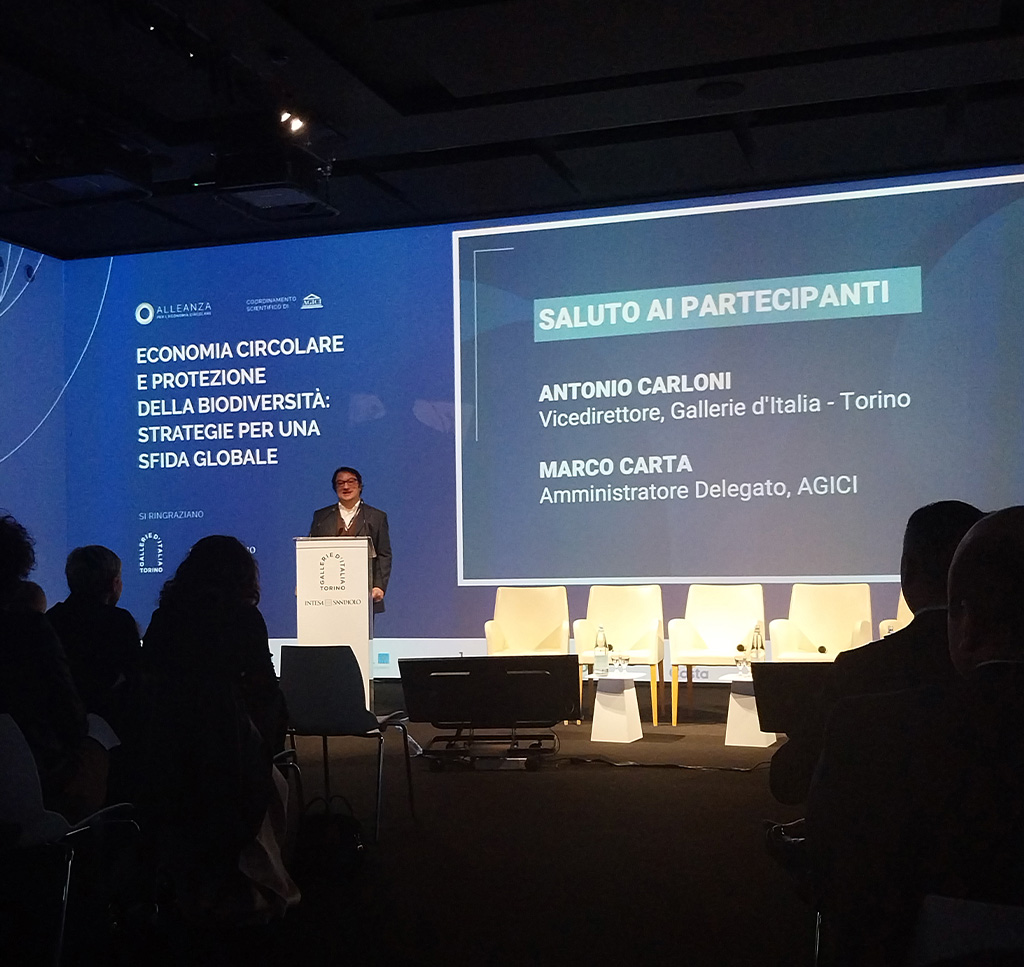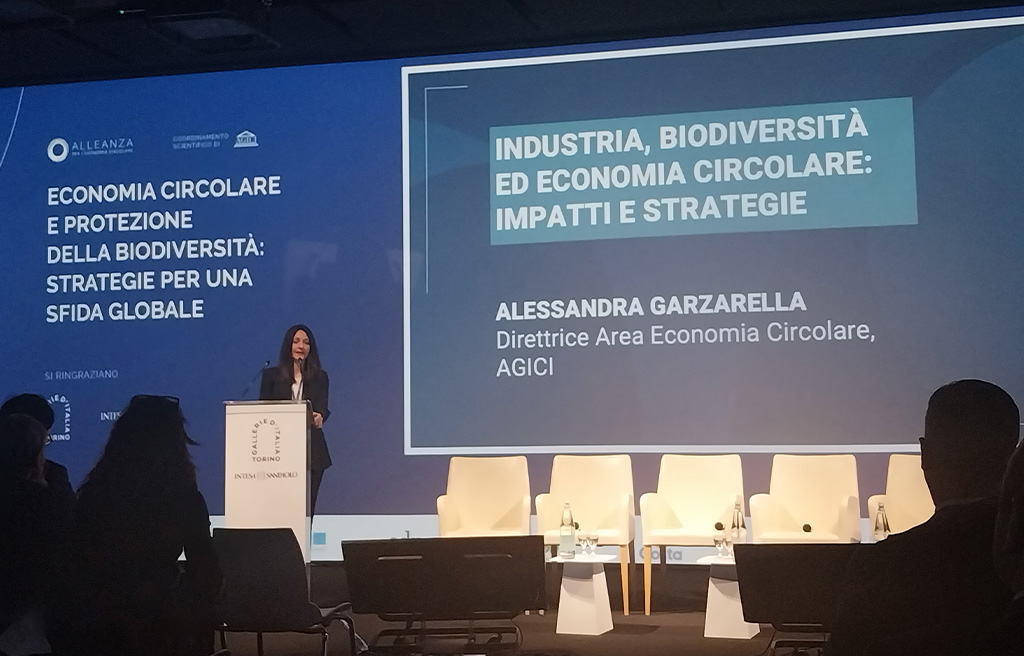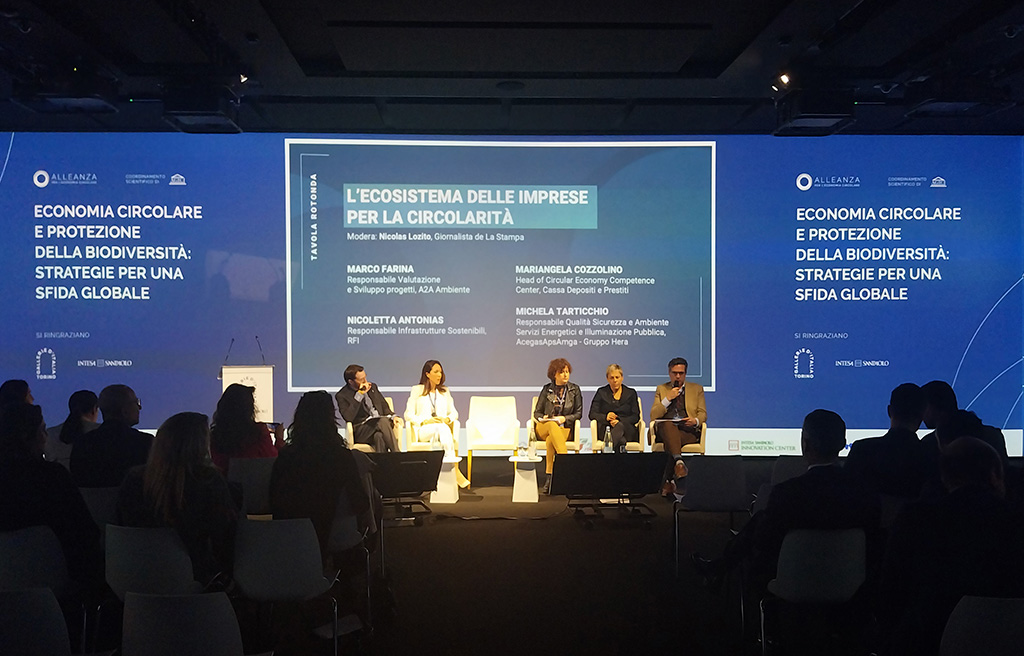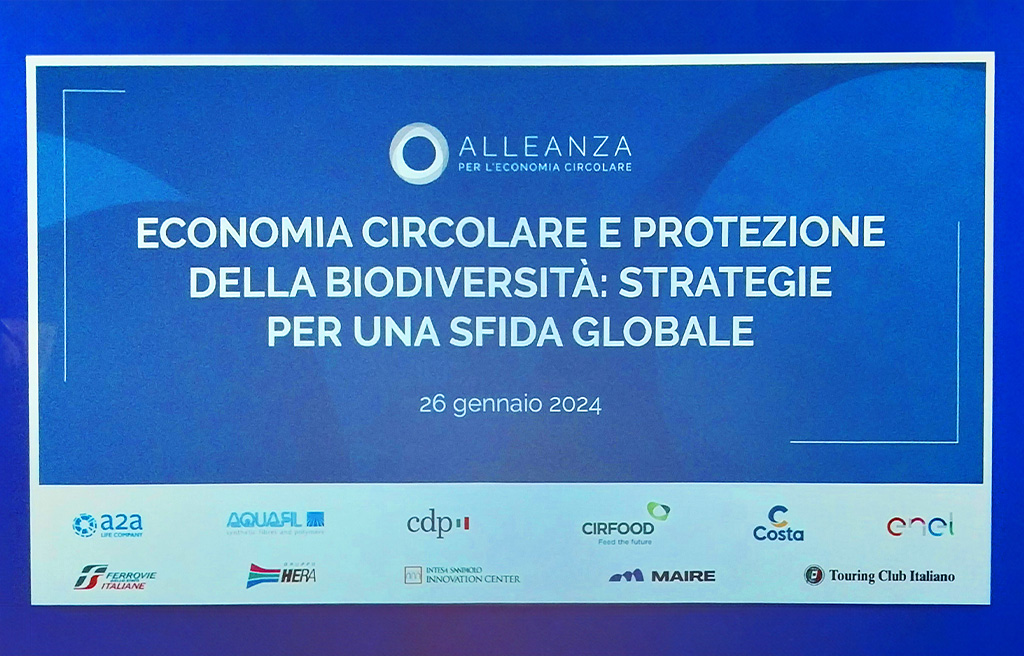Loss of biodiversity: the solution is the circular economy
The report created by AGICI was presented at the Gallerie d'Italia in Turin during the Workshop "Circular economy and protection of biodiversity: strategies for a global challenge" organized by the Alliance for the Circular Economy with the support of Intesa Sanpaolo Innovation Center
On Friday 26 January 2024 at the Gallerie D'Italia of Intesa Sanpaolo in Piazza San Carlo in Turin, was held the Workshop "Circular economy and protection of biodiversity: strategies for a global challenge", organized by the Alliance for the Circular Economy and AGICI, with the support of Intesa Sanpaolo Innovation Center.
A conference that, inspired by the presentation of the report "Industry, biodiversity and circular economy. Impacts of economic activities on biodiversity and possible mitigation solutions" realized by AGICI, has identified the circular economy strategies to change the trend.
Alessandra Garzarella, director of the Area Circular Economy of AGICI, has emphasized as in the last decades "the loss of biodiversity has deeply marked the ecosystem, putting at risk more than a million animal species and causing alterations to 75% of the emerged lands and marine environments": a problem to be addressed urgently.
Focusing on six key economic sectors (food, infrastructure, transport, clothing, energy and chemistry), the paper draws the attention on the link between biodiversity and the economy. For example, soil degradation has led to a 23% reduction in agricultural production capacity, with over a million animal species at risk of extinction.
To reduce the impact on the ecosystem there are several strategies that each company, based on its positioning along the supply chain, can implement: regenerative agriculture, recycling (mechanical and chemical) up to the selection of recyclable or compostable packaging, minimising the production of new waste. In order to reduce the impact of human activities on biodiversity, the report highlights the need to rethink the design of goods, services and infrastructure so that it is possible to estimate their effects on the environment throughout all the life cycle.
Introduced the report, Monika Koncz-Mackenzie - Strategic Designer Manager of the Ellen MacArthur Foundation (the world’s leading think-tank promoting the systemic transition to the circular economy) explained how biodiversity loss was particularly marked due to the linear economic model. However, by changing production processes and consumption habits, biodiversity and ecosystems can be protected through the regenerative approach of the circular economy.
the event is therefore continued with two thematic panels to which they have participated representatives of the societies that constitute the Alliance for the Circular Economy (A2A Life Company, Aquafil, CDP, CIRFOOD, Costa, Enel, RFI, Hera Group, Intesa Sanpaolo Innovation Center, MAIRE and Touring Club Italiano).
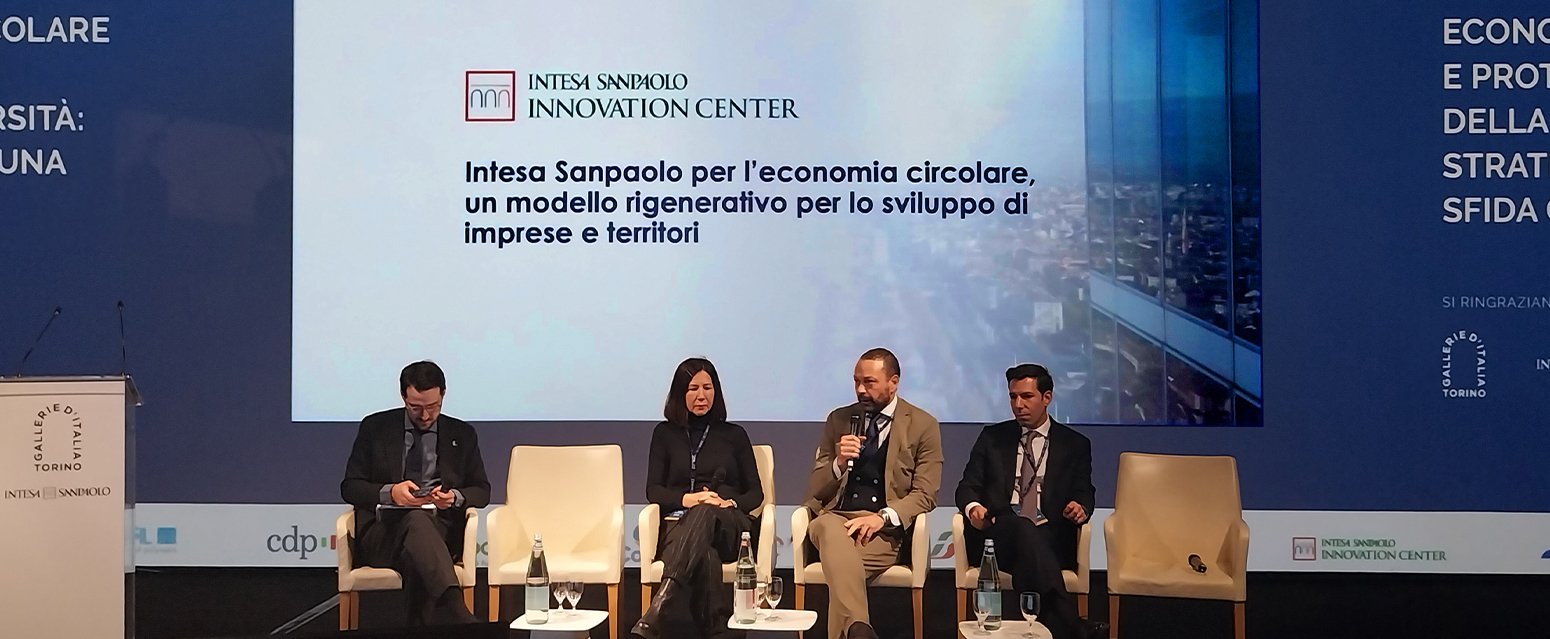
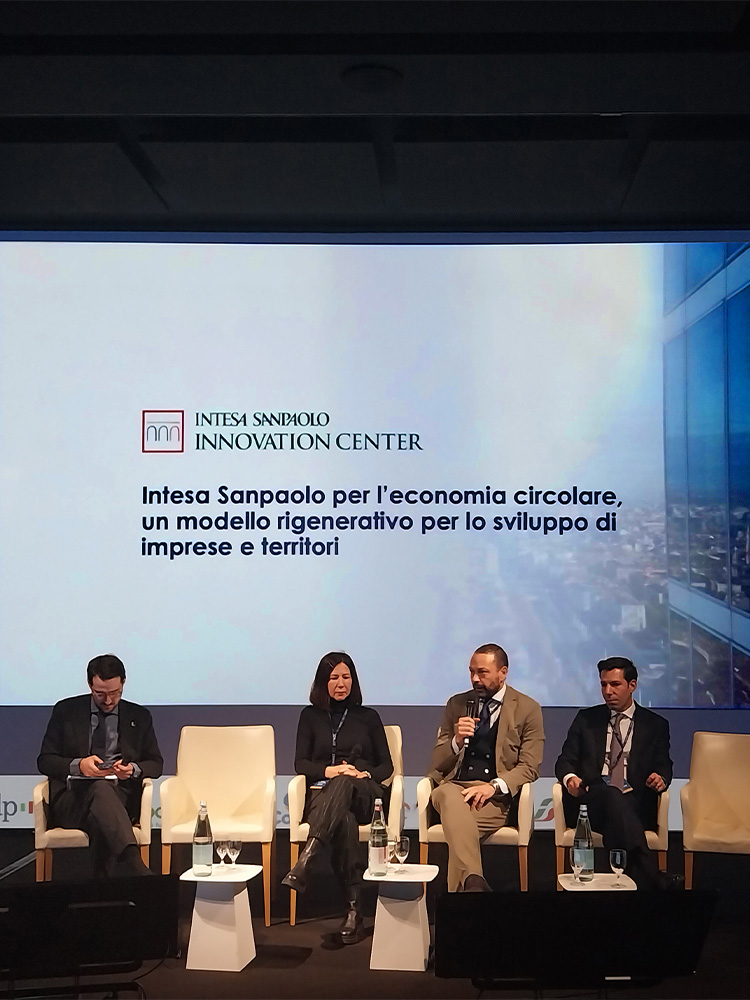
Marco Farina, - Project Evaluation and Development Manager of A2A Ambiente - opened the panel "The ecosystem of Enterprises for Circularity" addressing the issue of waste transformation into second raw materials, taking biomethane as an example (which has the same physical and chemical properties as fossil methane) producible by transforming food and other waste from our kitchens into resources. It is therefore essential to create new facilities and upgrade existing ones in order to turn waste into biomethane and then distribute it.
Mariangela Cozzolino - Head of Circular Economy Competence Center of Cassa Depositi e Prestiti - has therefore illustrated the lines of action of the financial institution that has started a path of wide transformation, based on the awareness that in a crisis context such as the present one it is necessary to look beyond the dual dimension of risk/return, incorporating all the factors of the sustainability in the company’s organizational and operating model in order to estimate the dimension of impact of the actions.
To follow Nicoletta Antonias - Responsible Sustainable Infrastructures of RFI - has shared the engagement of the Group FS in promoting an integrated model of sustainable infrastructural development in line with the European strategy and the PNRR, explaining how it also brings benefits to the territories in terms of growth and makes them more cohesive, inclusive and attractive.
Finally, Michela Tarticchio - Head of Quality Safety and Environment Energy Services and Public Lighting, AcegasApsAmga of the Hera Group - explained how the business plan (that will end in 2027) of the Hera Group is based on the principles of the circular economy, with investments that will focus on environmentally friendly projects by design, briefly illustrating some started in 2023.
Opening the panel "Innovation to close the circle", Massimiano Tellini - Head of Circular Economy of Intesa Sanpaolo Innovation Center - has highlighted the social role of the Intesa Sanpaolo Group, for which the impact is a fundamental dimension in reading circular activities. Recalling the support of Intesa Sanpaolo for the economic growth of our country, Tellini explained how, imagining the future 10 years ago, "we wanted to identify it with the trends of the circular economy".
For this reason, in addition to being the first financial institution partner of the Ellen MacArthur Foundation, the Group has created the Intesa Sanpaolo Innovation Center, dedicated to overseeing innovation issues and a centre of expertise for the Group on the Circular Economy. Tellini has therefore specified that the circular economy exceeds the theories of sustainability as regenerative by design, that is a field in which Italy is global leader.
"Since 2018 we have made available to our customers 14 billion of funding - added Tellini - that are activating on a global scale innovative transformative projects in a circular key". For this reason, the Circular Economy Lab was born from the collaboration between Intesa Sanpaolo Innovation Center and Cariplo Factory, with the aim of accompanying customers, entrepreneurs and the educational system in understanding that there is a change of economic paradigm even before environmental.
Change initiated by the EU in 2015 with the Circular Economy Package, mistakenly confused in the media with the issue of circular waste management. "We are at the center of a path that requires thinking according to business, economics, finance and design, with a challenge to win to express the potential of Made In Italy that must be addressed quickly and together. Only in this way, this will be another challenge that Italy will be able to win in Europe", said Tellini. Remembering how waste management is important, but only as a first step in the circular transition that goes beyond the concept of waste turning it into a resource.
Maria Giovanna Sandrini - Chief Communication Officer of Aquafil - has therefore illustrated the innovations that a multinational inserted in the chemical-textile sector is carrying out, such as the production of thread and polymers for nylon 6 used in carpet, in clothing and other design elements such as chairs, tables and sunglasses. The sustainable path, which began in 2006, has continued with several innovations aimed at transforming waste, and has developed in a cross-supply chain perspective through a systemic approach in which what is waste for one sector can become a resource for another, by stimulating collaborations between different sectors.
Finally, Massimo Di Amato - Managing Director MyRemono, MAIRE Group - has clarified how from 2018 the multinational leader in the construction of complex infrastructure in the petrochemical field, fertilizers and gas, through a phase of deep reorganization: on the one hand the realization of plant infrastructure; on the other the development of Sustainable Technology Solutions. The Group’s objective is to bring sustainable solutions to the market, also economically, recognising the importance of a cultural evolution in the approach to waste (from problem to resource).
After the comparison, Giuseppe Nisi of the Study Center for the Circular Economy of CONAI presented the circular strategies and flagship activities prepared by the National Consortium of Packaging for companies with regard to packaging and the delivery of recyclable waste, declined by product sectors. Silvia Grandi, General Director of Circular Economy of MASE, closed the event with the institutional conclusions illustrating the areas of action and operational policies of the Ministry to promote the circular economy and sustainable development, included in the Constitution from last February.
PICTURES OF THE EVENT

